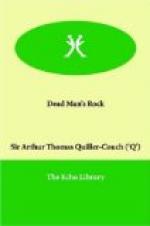of the Island. From the Resting House at the
foot of the Peak you will then ascend, following
the track of the Pilgrims, until you have passed
the First Set of Chains. Between these and
the Second there lies a stretch of Forest, in which,
still following the track, you will come to a Tree,
the trunk of which branches into seven parts
and again unites. This Tree is noticeable
and cannot be missed. From its base you must
proceed at a right angle to the left-hand edge of the
track for thirty-two paces, and you will come
to a Stone shaped like a Man’s Head, of
great size, but easily moved. Beneath this Stone
lies the Secret of the Great Ruby; and yet not
all, for the rest is graven on the Key, of which
mention shall already have been made to you.
“These precautions I have taken that none may surprise this Secret but its right possessor; and also that none may without due reflection undertake this task, inasmuch as it is prophesied that ’Even as the Heart of the Ruby is Blood and its Eyes a Flaming Fire, so shall it be for them that would possess it: Fire shall be their portion and Blood their inheritance for ever.’
“This prophecy I had
from an aged priest, whose bones lie
beneath the Stone, and
upon whose Sacred clasp is the Secret
written. This
and all else may God pardon. Amen.
“A. T.”
“He visiteth the iniquity
of the Fathers upon the Children unto
the third and fourth
generation.”
[To this extraordinary document was appended a note in another handwriting.]
“There is little doubt that the Ruby now in the possession of Mr. Amos Trenoweth is the veritable Great Ruby of which the traveller Marco Polo speaks. But, however this may be, I know from the testimony of my own eyes that the stone is of inestimable worth, being of the rarest colour, and in size greatly beyond any Ruby that ever I saw. The stone is spoken of, in addition to such writers as Mr. Trenoweth quotes, by Friar Jordanus (in the fourteenth century), who mentions it as ‘so large that it cannot be grasped in the closed hand’; and Ibn Batuta reckons it as great as the palm of a man’s hand. Cosmos, as far back as 550, had heard tell of it from Sopater, and its fame extended to the sixteenth century, wherein Corsali wrote of ’two rubies so lustrous and shining that they seem a flame of fire.’ Also Hayton, in the thirteenth century, mentions it, telling much the same story as Sir John Maundevile, to the effect that it was the especial symbol of sovereignty, and when held in the hand of the newly-chosen king, enforced the recognition of his majesty. But, whereas Hayton simply calls it the greatest and finest Ruby in existence, Maundevile puts it at afoot in length and five fingers in girth. Also—for I have made much inquiry concerning this stone—it was well known to the Chinese from the days of Hwen T’sang downward.
“Mr. Trenoweth has wisely forborne




